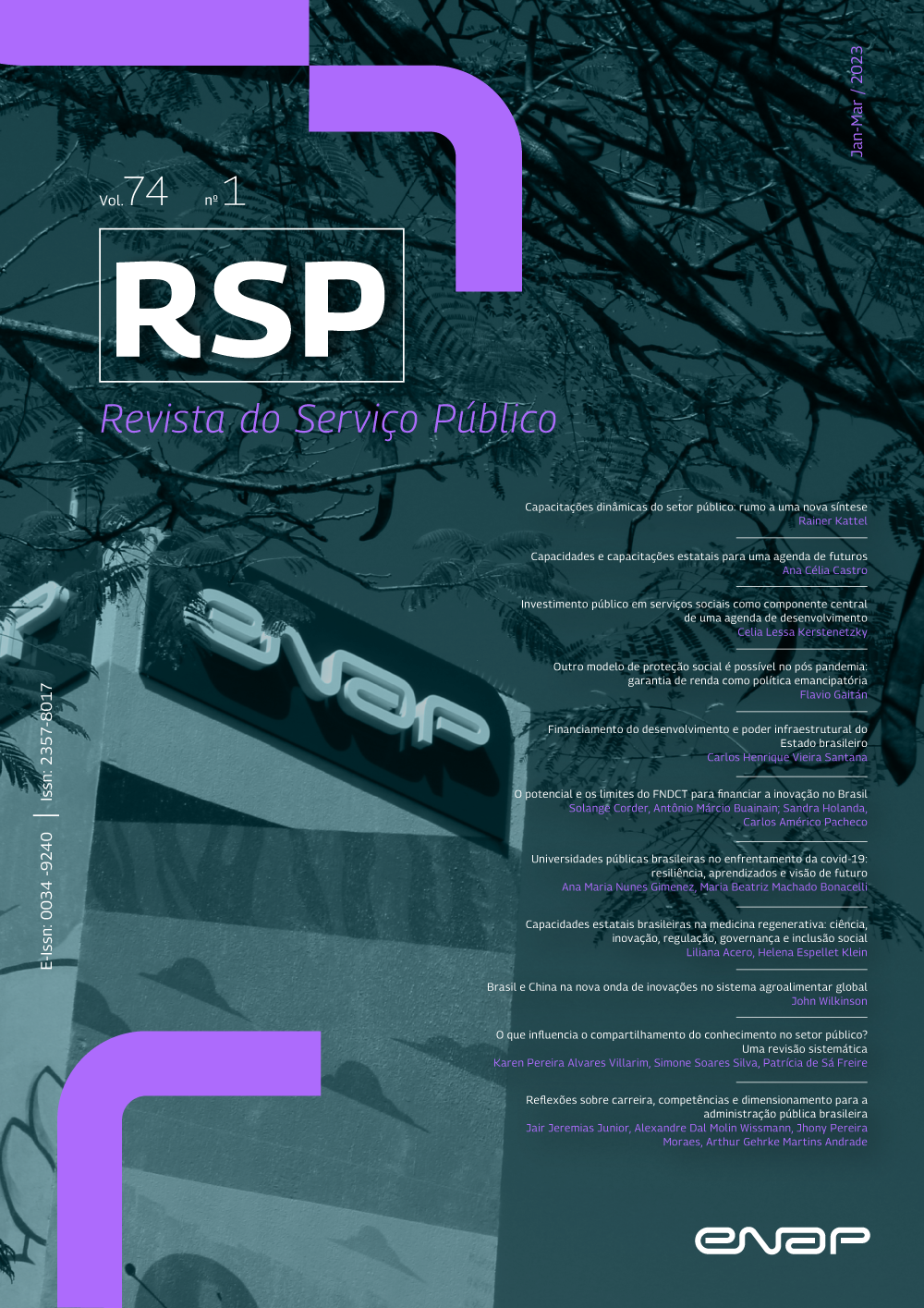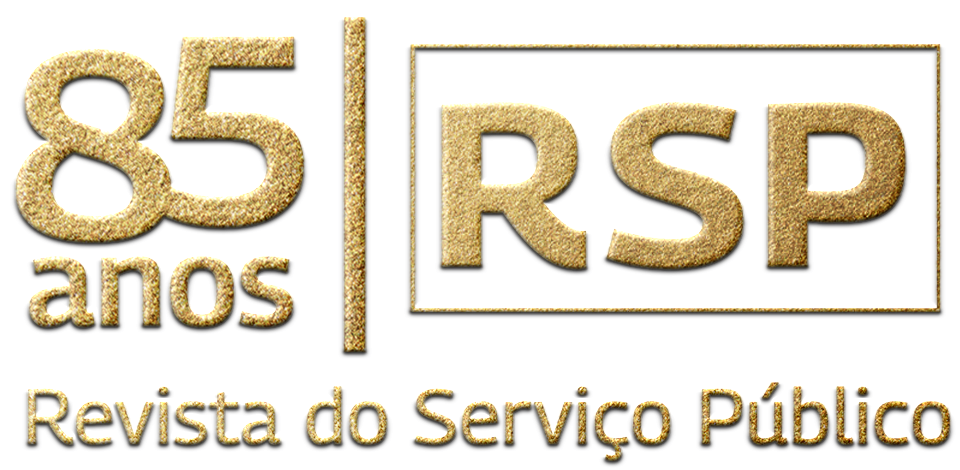Brazilian State capacities in regenerative medicine
science, innovation, regulation, governance and social inclusion
Keywords:
regenerative medicine, cell-based therapies, State capacities, public policies, scienceAbstract
Regenerative medicine has transformed conventional practices in medicine focusing upon the repair
and regeneration of cells and tissues, using different types of stem cells removed from human bodies
and generally reproduced in vitro. This has taken to new forms of regulation of biological materials and
required an upgrading of some State capacities at the public, private, local and supranational levels; shaping the aim of this article. A bibliographical and documentary study has been developed, using secondary data, qualitative analysis of interview information and qualitative study of statistical data. It concludes that a number of dynamic State capacities are being developed in the last ten years. However, missionoriented public policy has been almost inexistent, State scarcely focused and State action legitimacy is still being developed.
Downloads
References
ACERO, L. Science, public policy and engagement: debates on stem cell research in brazil. Life Sciences, Society and Policy, v. 3, n. 6, p. 15-31, dez. 2010.
ACERO, L. Pesquisas e terapias com células-tronco: governança, visões sociais e o debate no Brasil. Rio de Janeiro: E-papers, 2011.
ACERO, L. Regulação internacional e governança na medicina regenerativa: trajetórias do Reino Unido e a União Europeia e repercussões para a saúde coletiva global. OIKOS, v. 18, n. 2, p. 82–95, 2019.
ACERO, L. Uma análise de matérias televisivas em ciência: o caso da medicina regenerativa no Brasil. Revista Tecnologia e Sociedade, v. 16, n. 45, p. 76-91, 2020a.
ACERO, L. Qualidade das notícias em ciência e medicina: a imprensa na medicina regenerativa no Brasil. Desenvolvimento em Debate, v. 8, n. 1, p. 195-213, jan-abril 2020b.
ACERO, L; KLEIN, H. E. Coautorias nas publicações brasileiras sobre medicina regenerativa: assimetrias na colaboração científica internacional. RECIIS - Revista Eletrônica de Comunicação, Informação & Inovação em Saúde, Rio de Janeiro, v. 15, n. 4, p. 987-1005, out-dez. 2021.
ALMEIDA, E. C. E.; GUIMARÃES, J. A. Brazil’s growing production of scientific articles —how are we doing with review articles and other qualitative indicators? Scientometrics, v. 97, n. 2, p. 287-315, nov. 2013.
BHARADWAJ, A. Ethic of consensibility, subaltern ethicality: the clinical application of embryonic stem cells in India. BioSocieties, v. 8, n. 1, p. 25–40, mar. 2013.
BORTZ, G.; ROSEMANN, A.; VASEN, F. Shaping stem cell therapies in Argentina: regulation, risk management and innovation policies. Sociologias, v. 50, n. 21, p. 116-155, abr. 2019. http://dx.doi.org/10.1590/15174522-02105004.
BUBELA, T. et al. Is belief larger than fact: Expectations, optimism and reality for translational stem cell research. BMC Medicine, v. 10, p. 133–143, 2012.
BUSSU, S. et al. (eds.) The best of Sciencewise reflections on public dialogue. Londres: Sciencewise, 2014.
COLLINS, H.; EVANS, R.; WEINEL, M. STS as science or politics? Social Studies of Science, v. 47, n. 4, p. 580-586, jun. 2017.
COSSU, G. et al. Lancet Commission: Stem cells and regenerative medicine. The Lancet, Commissions, v. 391, n. 10123, p. 883-910, mar. 2018.
DECIT - Departamento de Ciência e Tecnologia, Secretaria de Ciência, Tecnologia e Insumos Estratégicos, Ministério da Saúde. Fomento as pesquisas em terapia celular e células tronco no Brasil. Revista de Saúde Pública, v. 44, n. 4, p. 763-4, ago. 2010.
LIMA, M. A. F. D.; GILBERT, A. C. B.; HOROVITZ, D. D. G. Redes de tratamento e as associações de pacientes com doenças raras. Ciência e Saúde Coletiva, v. 23, n. 10, p. 3247-3256, out. 2018.
FAULKNER, Alex. Opening the gateways to market and adoption of regenerative medicine? The UK case in context. Journal of Regenerative Medicine and Tissue Engineering, v. 1, n. 3, p. 321-330, abr. 2016.
GARCEZ, P. et.al. (2016) Zika virus impairs growth in human neurospheres and brain organoids. Science, v. 352, n. 6287, p. 816-818.
HILU, L.; GISI, M. L. Produção científica no Brasil: um comparativo entre as universidades públicas e privadas. In: CONGRESSO NACIONAL DE EDUCAÇÃO: 1° SEMINÁRIO INTERNACIONAL DE REPRESENTAÇÕES SOCIAIS SUBJETIVIDADE E EDUCAÇÃO, 10., 2011, Curitiba. Anais [...]. Curitiba: X Educere, 2011. p. 5664-5672. Disponível em: https://educere.bruc.com.br/CD2011/pdf/5221_3061.pdf. Acesso em: 15 dez. 2020.
HOROVITZ, D. D. G et.al. (2013) Genetic services and testing in Brazil. The Journal of Community Genetics, v. 4, n. 3, p. 355-375, jul. 2013.
INCT-REGENERA. Relatório parcial do Instituto Nacional de Ciência e Tecnologia em Medicina Regenerativa (INCT-REGENERA), 2019. Disponível em: https://www.inctregenera.org.br/. Acesso 15 out. 2020.
IRELAND, H. et al. The survey on cellular and tissue-engineered therapies in Europe and neighboring Eurasian countries in 2014 and 2015. Citotherapy, v. 20, n. 1, p. 1-20, jan. 2018.
JASANOFF, S. The fifth branch: Science advisors as policy makers. Cambridge: Harvard University Press, 1990
JASANOFF, S. Designs on Nature: Science and Democracy in Europe and the United States. Princeton: Princeton University Press, 2006.
KATTEL, R.; MAZZUCATO, M. Mission-oriented innovation policy and dynamic capabilities in the public sector. Industrial and Corporate Change, v. 27, n. 5, p. 787–801, out. 2018.
KREIMER, P. Public understanding of science and social studies of science: convergence or parallel paths? Science Communication Today 5: 1-16, 2015
KNORR-CETINA, K. Epistemic Cultures: How the Sciences Make Knowledge. Cambridge: Harvard University Press, 2006.
MACHADO, R.; VARGAS-QUESADA, B.; LETA, J. Intellectual structure in stem cell research: exploring Brazilian scientific articles from 2001 to 2010. Scientometrics, v. 106, n. 2, p. 525-537, 2016.
MACHADO, R. Produtividade científica brasileira na área de células-tronco (2001-2019). Revista Digital de Biblioteconomia e Ciência da Informação, v. 19, p. e021003, 2021.
MARIN, T.; PAGANI, E. Sistemas microfisiológicos compostos por organoides humanos em dispositivos microfluídicos: avanços e desafios. Vigilância Sanitária em Debate, v. 6, n. 2, p. 74-91, maio 2018.
MARTIN, P.; BROWN, N.; TURNER, A. Capitalizing hope: the commercial development of umbilical cord blood stem cell banking. New Genetics and Society, v. 27, n. 2, p. 127-143, 2008.
MASON, C.; DUNNILL, P. A brief definition of regenerative medicine. Regenerative Medicine, v. 3, n. 1, p. 2-5, jan. 2008.
MCGOWAN, M. et al. (2016) Let’s pull these technologies out of the ivory tower: the politics, ethos, and ironies of participant-driven genomic research. BioSocieties, v. 12, n. 4, p. 494–519, dez. 2017.
MEIRELLES, L. S.; CHAGASTELLES, P. C.; NARDI, N B. Mesenchymal stem cells reside in virtually all post-natal organs and tissues. Journal of Cell Science, v. 119, n. 11 p. 2204-2213, jun. 2016. http://dx.doi.org/10.1242/jcs.02932.
MENDEZ-OTERO, R.; CARVALHO, A. Global Update: Brazil. Regenerative Medicine, v. 7, n. 6, p. 144-147, 2012. http://dx.doi.org/10.2217/rme.12.84.
MOREIRA, M. et.al. Quando ser raro se torna um valor: o ativismo político por direitos das pessoas com doenças raras no Sistema Único de Saúde. Cadernos de Saúde Pública, v. 34, n. 1, e00058017, 2018.
MORRISON, M. Promissory futures and possible pasts: the dynamics of contemporary expectations in regenerative medicine. Biosocieties, v. 7, n. 1, p. 3-22, 2012.
MINISTÉRIO DA SAÚDE – MS. Priorização de Protocolos e Diretrizes Terapêuticas para Atenção Integral às Pessoas com Doenças Raras. Comissão Nacional de Incorporação Tecnologias no SUS. Relatório 142. Brasília: MS, 2015.
MUELLER, S. A publicação da ciência: áreas científicas e seus canais preferenciais. DataGramaZero - Revista de Ciência da Informação, v. 6, n. 1, p.1-13, 2005.
PAINTER, M; PIERRE, J. Unpacking Policy Capacity: Issues and Themes. In: PAINTER, M; PIERRE, J. (eds.) Challenges to State Policy Capacity: Global Trends and Comparative Perspectives, Nova York: Palgrave Macmillan Ltd., 2005, pp 1-18.
PERISSINOTTO, R.; NUNES, W. Capacidade estatal: uma discussão conceitual. Texto inédito, 2021.
RABERHARISOA, V. et al. From ‘politics of numbers’ to ‘politics of singularisation’: Patients’ activism and engagement in research on rare diseases in France and Portugal. Biosocieties, v. 9, n. 2, p. 194–217, jun. 2014.
ROSEMANN, A. et al. Global regulatory developments for clinical stem cell research: diversification and challenges to collaborations. Regenerative Medicine, v. 11, n.7, p. 647-657, out. 2016.
SAAD, N. Em decisão inédita, Anvisa libera terapias alternativas no Brasil. Portal R7. fev. 2020. Disponível em: https://noticias.r7.com/saude/em-decisao-inedita-anvisa-libera-terapias-alternativas-no-brasil-21022020. Acesso em: 15 nov. 2020.
SANTOS, P. R.; GUERRANTE, R. S. Análise quantitativa e qualitativa do patenteamento de células tronco no Brasil. Rio de Janeiro: INPI, 2010.
SAREWITZ, D. How science makes environmental controversies worse. Environmental Science & Policy, v. 7, n. 5, p. 385–403, 2004.
SIDONE et.al. A ciência nas regiões brasileiras: evolução da produção e das redes de colaboração científica Transinformação, Campinas, 28(1):15-31, jan./abr., 2016
SLEEBOOM-FAULKNER, M.; HWANG, S. Governance of stem cell research: public participation and decision-making in China, Japan, South Korea, Taiwan and the UK. Social Studies of Science, v. 42, n. 5, p. 684-708, 2012.
SLEEBOOM-FAULKNER, M, et al. Comparing national home-keeping and the regulation of translational stem cell applications: An international perspective. Social Science & Medicine, v. 153, p. 240-249, 2016.
SOARES, J.; DEPRÁ, A. Ligações perigosas: indústria farmacêutica, associações de pacientes e as batalhas judiciais por acesso a medicamentos Physis, Revista de Saúde Coletiva, v. 22, n. 1, p. 311-329. 2012.
SOUZA, A. Periódicos científicos do Brasil e o dilema: publicar ou não em inglês? Scielo em Perspectiva. Online, 01 set. 2017. Humanas. Disponível em: https://humanas.blog.scielo.org/blog/2017/09/01/periodicos-cientificos-brasileiros-e-o-dilema-publicar-ou-nao-em-ingles/. Acesso em: 03 jan. 2021.
TOLEDO, K. Grupo da USP testa métodos para monitorar identidade de células-tronco pluripotentes. Agência FAPESP. maio 2018. Disponível em: .https://agencia.fapesp.br/grupo-da-usp-testa-metodos-para-monitorar-identidade-de-celulas-tronco-pluripotentes/27757/. Acesso em: 15 jul.2021.
TURNER L. ISSCR’s Guidelines for Stem Cell Research and Clinical Translation: Supporting development of safe and efficacious stem cell-based interventions. Stem Cell Reports, v. 16, n. 6, p. 1394-1397, 2021.
VILELA, P. Governo lança programa para mapear genoma de 100 mil brasileiros. Banco de dados vai estruturar medicina de precisão no país. Agência Brasil. out. 2020. Disponível em: https://agenciabrasil.ebc.com.br/geral/noticia/2020-10/governo-lanca-programa-para-mapear-genoma-de-100-mil-brasileiros. Acesso em: 12 jul. 2021
WEBSTER, A.; HADDAD, C.; WALDBY, C. Experimental heterogeneity and standardization: stem cell products and the clinical trial process. BioSocieties, v. 6, n. 4, p. 401-419, out. 2011.
WEIBLE, C. M.; PATTISON, A.; SABATIER, P. A. Harnessing expert-based information for learning and the sustainable management of complex socio-ecological systems. Environmental Science & Policy, v. 13, n. 6, p.522-534, out. 2010.
Downloads
Published
How to Cite
Issue
Section
License
Copyright (c) 2023 Revista do Serviço Público

This work is licensed under a Creative Commons Attribution-NonCommercial-ShareAlike 4.0 International License.
- A RSP adota a licença Creative Commons (CC) do tipo Atribuição – Uso Não-Comercial (BY-NC).
- A licença permite que outros remixem, adaptem e criem obra licenciada, sendo proibido o uso com fins comerciais.
- As novas obras devem fazer referência ao autor nos créditos e não podem ser usadas com fins comerciais, porém não precisam ser licenciadas sob os mesmos termos dessa licença.
- Ao publicar o artigo na RSP, o autor cede e transfere para a ENAP os direitos autorais patrimoniais referentes ao artigo.
- O artigo publicado na RSP não poderá ser divulgado em outro meio sem a devida referência à publicação de origem.
- O autor que tiver o artigo publicado na RSP deverá assinar o Termo de Concessão de Direitos Autorais (em momento oportuno a editoria da Revista entrará em contato com o autor para assinatura do Termo).



